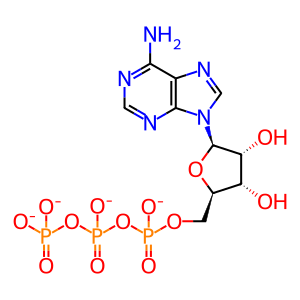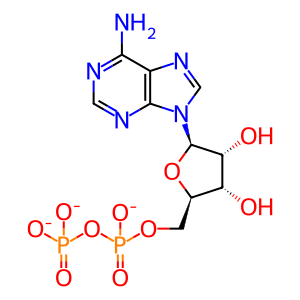Reaction: CDK5:p25 phosphorylates JUN
- in pathway: Deregulated CDK5 triggers multiple neurodegenerative pathways in Alzheimer's disease models
Based on mouse model studies, the JUN transcription factor undergoes biphasic activation in Alzheimer's disease. JUN is phosphorylated directly by p25-bound CDK5 at serine residues S63 and S73. CDK5:p25-mediated increase in the level of reactive oxygen species (ROS) triggers activation of JNK kinases (MAPK8, MAPK9, MAPK10), which phosphorylate JUN at S63 and S73 at a later time point (Sun et al. 2009).
Aberrant activation of CDK5 by p25 binding also triggers activation of MKK6 (MAP2K6), a p38 MAP kinase. Levels of phosphorylated MAP2K6 are increased in Alzheimer's disease. Activation of p38 MAP kinase(s) results in increased JUN expression (Chang et al. 2010).
Reaction - small molecule participants:
ADP [nucleoplasm]
ATP [nucleoplasm]
Reactome.org reaction link: R-HSA-8868666
======
Reaction input - small molecules:
ATP(4-)
Reaction output - small molecules:
ADP(3-)
Reactome.org link: R-HSA-8868666


